4 Sep 2019 | China, News
[vc_row][vc_column][vc_single_image image=”108932″ img_size=”full” add_caption=”yes”][vc_column_text]The Anti-Extradition Bill Movement began with the Hong Kong government’s attempt to amend the extradition bill, which would allow people residing in Hong Kong to be extradited to and tried in the mainland China. Within months, the protest developed into a massive and sustained movement. In one of the many marches, two million Hong Kongers showed up. Protesters also extended their goals and demanded the government investigate police brutality, drop charges against protesters who had been arrested, and implement democratic reform.
Scholars, commentators, and international observers alike are all stunned by the movement. We, common Hong Kongers, are also surprised by our own actions.
We have not achieved our goals yet, so it may sound overconfident to say that protesters worldwide can draw lessons from us. However, this movement grew out of a period of abeyance following the 2014 Umbrella Movement. We may not be able to tell others how to win a battle, but people can learn from us on how to mobilise and how to sustain a mobilisation.
Lesson One
Be tolerant to your fellow protesters who do not strictly share your tactical principles or ideologies.
The Umbrella Movement ended with a split within the opposition camp. Pan-democrats and traditional left-leaning movement groups split with localists, and militants engaged in heated and sometimes toxic verbal quarrels with pacifists and moderates. Social media such as Facebook magnified the mutual resentment. It was very demoralising.
The current movement sees a curious reengagement between militants and moderates. One major reason, of course, is that the government has become more oppressive. Blatant police brutality naturally unites people of all ideologies. Yet, we should also attribute the maintenance of unity to protesters’ willingness to learn from each other and to tolerate differences.
We may already have forgotten, but the first major resistance against the extradition bill was not on the streets. It was within the legislature. Pan-democratic lawmakers, many of whom were not comfortable with physical conflicts, made a “leap of faith” and became more militant. They filibustered, occupied chambers, surrounded a pro-Beijing lawmaker who tried to illegitimately chair the bill’s committee, and clashed with security officers. Their willingness to break some taboos earned them certain recognition from radicals and militants.
The first major test of unity came when militant protesters stormed into the legislature on 1 July, the anniversary of the handover of Hong Kong to China. The breaking of windows and vandalism could have easily alienated moderates. Yet, the militants tried hard to explain their action to seek understanding, and professed a strong sense of determination. Moderates, including the pan-dems, decided to not sever ties with them.
Another trial came when the controversial brawl at the airport broke out. The tying up of a reporter from the Global Times, who protesters believed was an undercover police officer from China, was certainly quite hard for moderates to swallow. However, some militants apologised the next day, providing moderates with the space to continue to stay united.
While radical militants repeatedly attacked police stations, moderates have so far tried to understand their anger and rejected the government’s accusation of riots. When moderates held a massive march the weekend after the airport demonstration, militants, despite believing that peaceful tactics were “useless,” joined in.
This unity is, of course, far from perfect. Moderates and militants continue to exchange strongly worded jibes and critiques. But both sides are more willing than before to cross the aisle. The classical tactic employed by the Chinese Communist Party to quell dissidents is the “united front”: unite with secondary enemies while attacking the major ones. In some sense, Hong Kong protesters have finally adopted this principle. Tactical and ideological differences are secondary, the primary enemy is the government. If the CCP wants to divide and destroy, then we need to unite and resist.
Lesson Two
Be water, be creative, and be humble.
“Be water” is probably the highest principle of mobilisation in this movement. The idea comes from the martial artist and film star Bruce Lee: “Be formless, shapeless, like water… Water can flow, or it can crash. Be water, my friend.” The point is to reject any form of tactical formalism.
During the Umbrella Movement, one of the major difficulties that occupants faced was that it was very costly to maintain an occupied area. It required a sustained flow of resources, a continuous presence of a critical number of occupants, and constant alert over police attack. Contentious action is tiring. Rest is much needed.
This time, protesters have adopted a repeated pattern of “march, attack and rest”: taking action (peaceful or militant) on a weekend, go home and then come out on the streets again next week.
A sustained and prolonged movement is very tiring. Creativity helps. Newness of action encourages people to fight on. The repertoire of tactics has expanded rapidly in this movement. The “traditional” marching route begins in Victoria Park on Hong Kong Island, and ends at the government headquarters. All three million-strong marches roughly followed this route. Yet, protesters have taken an unprecedented step: holding marches and assemblies all over Hong Kong.
When I joined the march on the streets of Kowloon in July, the experience was refreshing. I never imagined I could walk on roads outside the iconic Peninsular Hotel. Sometimes a new action can be very random. When the police violently arrested a student for buying laser pointers, and accused him of possessing “offensive weapons”, people were outraged. Some angry protesters surrounded the police station and were later dispersed by tear gas. On another night, protesters held a “stargazing assembly” outside the Space Museum. All the participants brought laser pointers along. It turned into “a symphony of lights” and, eventually, a dance party.
Hong Kongers are also humble enough to learn from foreign examples. In 2014, protesters imitated the Lennon Wall in Prague and made up one of their own at the occupied zone with colorful postscripts. This time, Lennon Walls sprang up everywhere. The one near the Tai Po Market subway station developed into a spectacular “Lennon Tunnel.” And on 23 August, the 30th anniversary of the Baltic Way, when a human chain stretched across the Baltics in opposition to Soviet rule, we gathered together and built our Hong Kong Way.
Scholars of social movements such as Sidney Tarrow have long been studying how movement tactics diffuse. Some tactics are modular, meaning that they are prevalent and adaptable to new settings. Yet, each specific action also has to resonate with local cultures in order to be effective and affective. In this sense, Hong Kongers “indigenised” both the Lennon Wall and the Baltic Way.
The Hong Kong Way is especially telling. Protesters formed human chains modelling three major subway lines. Moreover, one chain extended onto the symbolic Lion Rock and participants lit it up with cell phone flashlights. When protesters hung a huge yellow banner on that hill in 2014, the “Lion Rock Spirit,” which originally represented economic development, was redefined to a spirit for democracy. The spirit was redefined again by the Hong Kong Way, professing unity, persistence and hope in the face of oppression and darkness. Others far away can learn from us, just as we have learned from those far away from us in space and time
Lesson Three
Stand up to bullies.
When kids are bullied, we teach them to stand up. Retreat or concession will only embolden the bullies. But, when it comes to politics, we seem to quickly come up with the conclusion that “politics is the art of compromise”. It is very common to hear people saying: “Beijing is too strong, don’t oppose it.” “We can gain so much by befriending China, what is the point of becoming its enemies?” But condoning bullies always has consequences. We all know that.
When the Hong Kong government first introduced the proposed extradition amendments, many believed that there was no way to stop the legislation process. The almighty Beijing was behind Carrie Lam, the chief executive of Hong Kong, and civil society was suffering from demobilisation after 2014. The first march against the bill was so small and seemingly insignificant that no one paid serious attention to it. Lam and her colleagues were emboldened, and belittled all opposition voices, including those from the legal sector. People were outraged, and momentum was built up step by step. Our mobilisation eventually forced Lam to suspend the bill (though we are demanding a complete withdrawal).
We still do not know whether we will come out victorious. But we know that we have to fight on. For if we concede now, we will suffer from serious consequences.
Hong Kong’s aviation industry is probably one of the most progressive sectors in the city. Beijing was not happy when a small number of pilots and cabin crew voiced support for the protests. The CCP pressurised the airlines to take action. The biggest Cathay Pacific, owned by conglomerate Swire, launched a heavy crackdown against its own managers and employees to kowtow to Beijing. The reason for surrendering, of course, is the company’s heavy reliance on China’s market and airspace. By conceding to bullying, Cathay Pacific not only lost Hong Kongers’ support, but also allowed Beijing to further step up its repression. Hong Kong cannot become another Cathay.
The fight against the extradition bill is Hong Kong’s battle against Beijing’s bullying. We have conceded so much in recent years that we have learned that, in fact, concession will only invite more intrusive oppression, and even violence. This is not to say that one can start an outright war with a bully without assessing one’s own costs and benefits. Yet, principled self-defense is always necessary. If you do not stand up, no one will stand up for you.
Be water, my friend. Also, be brave and be principled.[/vc_column_text][vc_basic_grid post_type=”post” max_items=”4″ element_width=”6″ grid_id=”vc_gid:1567590823109-829eac1b-4d0e-1″ taxonomies=”581″][/vc_column][/vc_row]
26 Mar 2019 | Academic Freedom, News, Turkey
[vc_row][vc_column][vc_column_text]UPDATE: Prof. Zübeyde Füsun Üstel, whose 1 year and 3 months prison sentence was upheld on 25 February 2019, is due to begin her prison sentence within ten days, Frontline Defenders reported on 30 April 2019.[/vc_column_text][vc_column_text]

Zübeyde Füsun Üstel
A Turkish academic, who was given a 15-month jail sentence for signing a petition calling for peace in south-east Turkey, has had her sentence upheld and now faces prison. She is likely to be the first academic to be imprisoned for signing the petition.
Zübeyde Füsun Üstel’s 15-month jail sentence, originally imposed in April 2018 for signing a petition drafted by Academics for Peace, was upheld by the Turkish Court of Appeals on 25 February 2019. Üstel is a retired professor from Galatasaray University in Istanbul.
This decision by the appellate court means that she is in danger of being imprisoned very soon.
The peace petition — We Will Not Be a Party To This Crime — was initially signed by 1,128 academics and grew to 2,020 in the weeks after it was released in January 2016. Since then, the signatories have been subjected to a range of actions against them, including criminal and administrative investigations, detention, dismissals and revocation of their passports. As of December 2017, more than 400 academics have been dismissed and hundreds of PhD students have lost their scholarships.
Academics for Peace is an organisation of university professors and graduate students who drafted and launched the petition, which denounced the human rights violations committed by the government in the Kurdish regions of Turkey, demanded access to these areas for independent national and international observers, and called for a lasting peace to be secured.
“I think Professor Fusun Üstel’s case is a new illustration of the criminalisation of free speech in present-day Turkey,” said Noemi Levy-Aksu, an academic for peace whose case is still pending.
Üstel was the first academic to refuse the legal provision the courts offer when prison sentences are less than two years. The provision involves suspending the pronouncement of judgment for a period of five years, during which the defendant is supposed to refrain from committing further “crimes”. Since what constitutes a crime in Turkey can be arbitrarily changed or determined by the political establishment, this provision aims to discipline defendants by placing them under supervision by the government. However, the advantage to the provision is that the suspect is left with no criminal record, barring their good behavior.
In her court hearing in April 2018, Üstel refused the offer of a suspension and was consequently sentenced to 15 months in prison. She appealed, but it was rejected on 25 February. She could become the first academic to be imprisoned since the trials began in December 2017. Nine other academics have refused the suspension provision and are waiting to appear before the court of appeals, according to the Academics for Peace website.
Following the confirmation of Üstel’s sentence, new initiatives have been started to raise awareness about her and all of the other Academics for Peace cases.
“An open letter has been endorsed by Academics for Peace-US and UK, academic and human rights organisations and more than 1500 academics from all around the world. Other initiatives are ongoing, especially in Germany, France, the US and the UK, where many academics from Turkey are now based,” said Levy-Aksu.
Investigations were opened by the government individually against each petition signatory on charges of “conducting propaganda for a terrorist organisation.” This is the charge professor Üstel is currently facing, as per the Article No. 7/2 of the Anti-Terror Law No. 3713.
Some judges, including one dissenting judge in Üstel’s appeal case, believe the academics should not be tried under the anti-terror law on the charge of propagandizing for a terrorist organisation. Instead, they argue that Üstel’s and other cases should be considered as per the Article 301 of the Turkish penal code on the charge of “degrading the state of the republic of Turkey”.
“From the beginning, the trial of the Academics for Peace relied on very shaky grounds, both in terms of procedure and substance. The inconsistency of the decisions taken by the different courts show the arbitrariness of the process. Verdicts have been erratic and varied from 15 to 36 months imprisonment,” said Levy-Aksu.
Almost 600 of the signatories are currently undergoing trials on grounds of engagement in “propaganda for a terrorist organisation.”
Üstel published a series of articles in Turkey-based and international journals of social sciences. Her articles have mostly focused on the history of Turkey, nationalism and issues of identity.
Since its founding in 2012, Academics for Peace has organised different actions to highlight attacks on the Kurds in south-east Turkey, and to call for the Turkish government to change its policy towards the Kurds. In 2012 it issued a statement showing support for Kurdish prisoners’ demands for peace in Turkey. This statement was signed by 264 academics from over 50 universities.
Since January 2016 when they published the peace petition, the Academics for Peace case has remained a symbol of the ongoing crackdown on the right to protest and speak out against the government in Turkey.
“In the current circumstances this will highly depend on governmental policy. The other venue to challenge the decision is the European Court of Human Rights, before which several applications have already been brought,” said Levy-Aksu.[/vc_column_text][/vc_column][/vc_row][vc_row][vc_column][vc_basic_grid post_type=”post” max_items=”12″ style=”load-more” element_width=”6″ grid_id=”vc_gid:1556799978592-db3cfbd5-6c56-0″ taxonomies=”7355, 8607″][/vc_column][/vc_row]
11 Feb 2019 | Magazine, News, Student Reading Lists
[vc_row][vc_column][vc_column_text]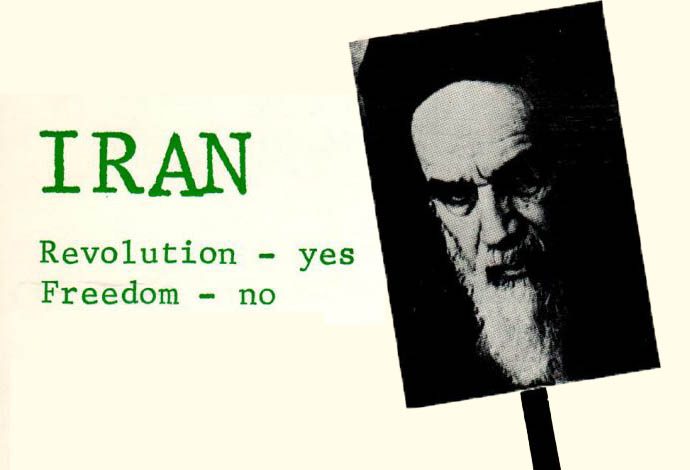
Forty years ago, on 11 February 1979, the rule of Mohammad Reza Pahlavi, the last shah of Iran, came to an end after millions of Iranians, from all backgrounds, took to the streets in protest at what they saw as an authoritarian, oppressive and lavish reign.
After decades of royal rule, and following 10 days of open revolt since the return of Ayatollah Khomeini to the country after 14 years of exile, Iran’s military stood down. With Pahlavi forced to leave the country, the Islamic Republic of Iran was declared in April 1979.
Here Index on Censorship magazine highlights key articles from its archives from before, during and after the revolution, an event that has since shaped the entire Middle East and has had a lasting impact to this day.
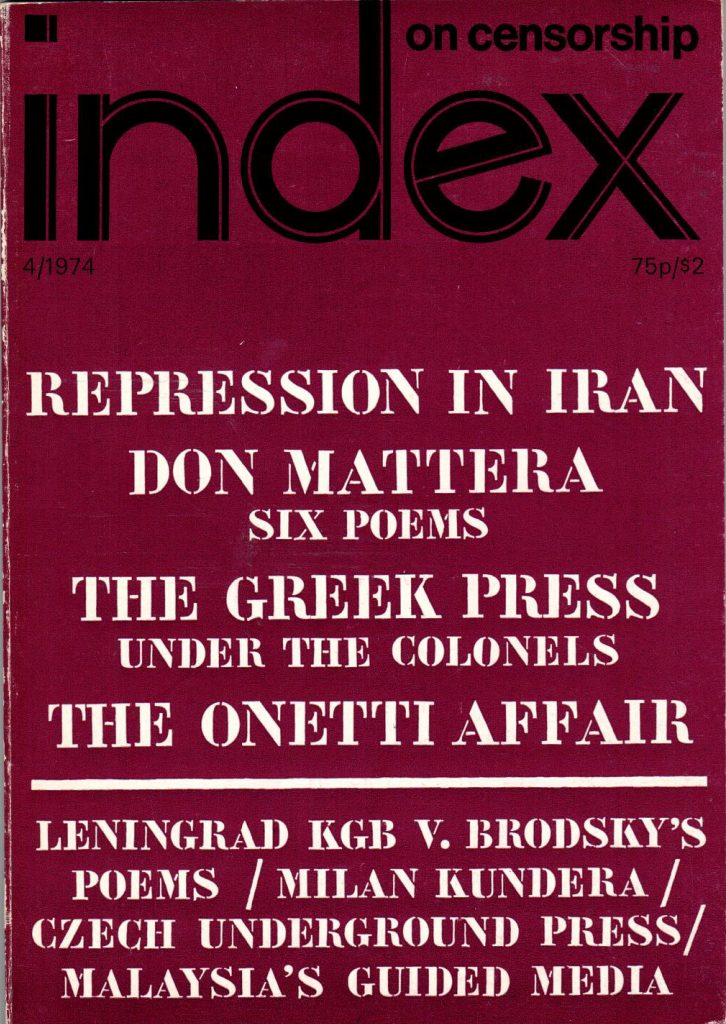
Repression in Iran , the Winter 1974 issue of Index on Censorship magazine
Repression in Iran
Ahmad Faroughy
December 1974, vol. 3, issue 4
In October 1972, the shah of Iran celebrated the 2,500th year of Persian Monarchy which, despite twenty national dynastic changes, has constantly endeavoured to remain Absolute. Although the aim of this article is not to debate the political merits and demerits of autocracy as a means of government, it is obvious that whatever minor benefits Iran may have derived from hereditary dictatorship, freedom of expression is certainly not one of them.
Read the full article

China: Unofficial texts, the September 1979 issue of Index on Censorship magazine
The press since the shah
M. Siamand
September 1979, vol. 8, issue 5
The Muslim clerical establishment had not been decimated, and the various peoples of Iran, showing a remarkable unanimity, rallied behind the exiled Ayatollah to overwhelm the imperial army into submission by staring it In the face. What the great majority of observers regarded as impossible has come to be: the minority cultures seem no longer in danger of quick extinction, and everyone is engaged in an exhilarating debate about the future. But unfortunately, threatening clouds can be seen gathering on the horizon. The revolution has not yet started to devour its own children, yet some powerful men in the new hierarchy are already saying that it might have to do so: secular, democratic opponents of the former regime are denounced as counter-revolutionaries, most clergymen seem determined to turn Iran into an intolerant theocracy and a cultural backwater, and martyrdom for Islam is held up for the young as the highest achievement they should aim at.
Read the full article

The rebirth of Chilean cinema in exile, the April 1980 issue of Index on Censorship magazine
Explaining Iran
Edward Mortimer
April 1980, vol. 9, issue 2
An extraordinary exhilaration gripped the Iranian people as the revolution at last triumphed and the remnants of the imperial regime suddenly crumbled away. One returns to confront the irritation of a European intelligentsia which is at once alarmed by the possible consequences of the Iranian revolution and perplexed by the fact that it does not quite fit into any of the ideological pigeon-holes which Western thought had prepared for it; and one is expected to atone by taking responsibility for the events which follow it.
Read the full article

Iran: Revolution – yes, Freedom – no, the June 1981 issue of Index on Censorship magazine
Iran since the shah
Leila Saeed
June 1981, vol. 10, issue 3
Concern for the restoration of social justice, for basic human rights, as well as national independence, provided the fundamental motive for the formidable mass movement which brought down the Pahlavi dynasty in February 1979. Iranians of different social backgrounds, ethnic and religious groups, of different creeds and ideologies came together in their revolt against the oppressive and arbitrary regime. And it was religion which provided the formal channels and the leadership by means of which the opposition expressed its demands and conducted its struggle.
Read the full article

Writers and Apartheid, the June 1983 issue of Index on Censorship magazine.
The Islamic attack on Iranian culture
Amir Taheri
June 1983, vol. 12, issue 3
Book-burning did not become an Islamic tradition. On the contrary. The Bedouin’s enchantment in front of the written word soon prevailed over the Caliph’s ‘ impulsive outburst. Islam expanded and developed into an established religion with universal appeal, and became an accidental heir to the wisdom of the classical world which it later passed on to the West. In 1979, in the triumph of the Islamic Revolution in Iran, an echo of Omar was heard. In their hatred of the “corrupt” contemporary world, Iran’s mullahs, who had designed and led the revolution, tried to “return to the source” and recreate the early Islamic society as they imagined it. An important step in that direction was what the revolution’s Supreme Guide, Ayatollah Ruhollah Khomeini, described as “deculturisation”.
Read the full article

Samuel Beckett: Catastrophe, the January 1984 issue of Index on Censorship magazine.
Iran under the Party of God
Gholam Hoseyn Sa’edi
February 1984, vol. 13, issue 1
Censorship was planned by the regime of the Islamic Republic even before the February 1979 revolution brought Ayatollah Khomeini’s theocratic oligarchy to power. This particular kind of censorship may not be without precedent in history, but it must certainly be rare. There were attacks on coffee-houses, restaurants and other public places by men armed with clubs and stones; unveiled women were harassed; slogans of the opposition were cleaned from the walls; banks, cinemas and theatres were burned. None of this seemed to follow any specific plan, but nonetheless it just kept on happening. Men with angry faces, dressed in shabby clothes, would be seen lurking in corners; they would come out for a moment of sudden violence and then disappear again. An astute observer might have called those attacks wounds on the body of the revolution as it was in the process of taking shape, but not many people noticed, and consequently they saw this deranged behaviour simply as a sign of revolutionary anger and class hatred.
Read the full article
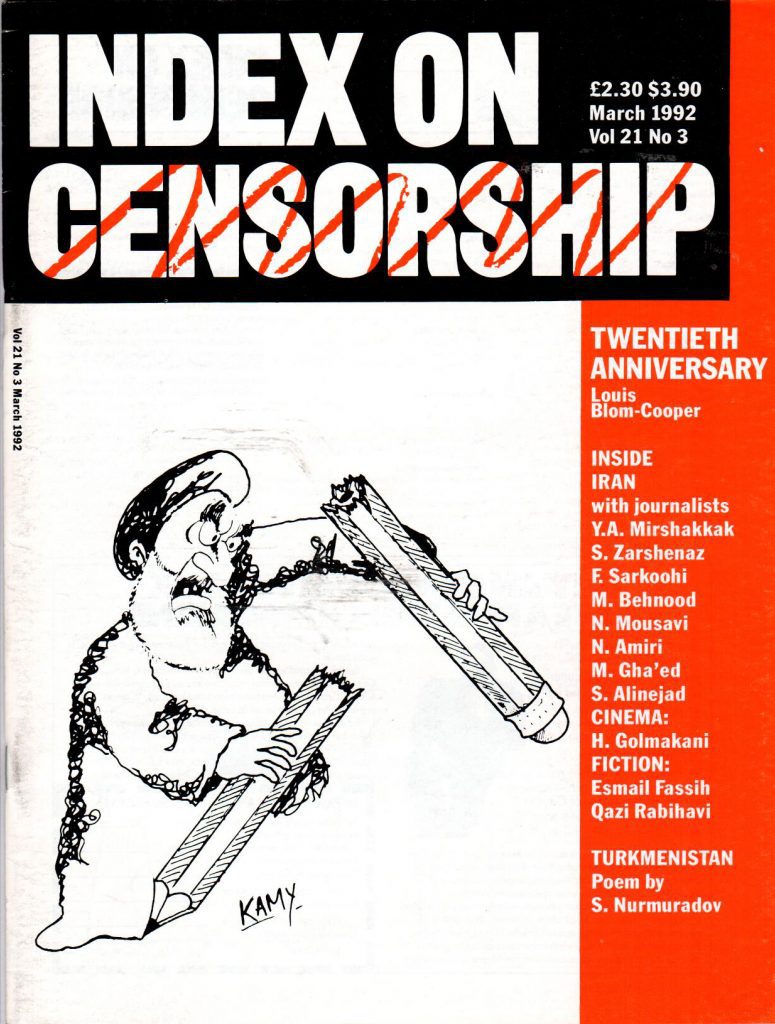
20th Anniversary: Freedom and responsibility, the March 1992 issue of the Index on Censorship magazine.
Inside Iran: A Special Survey
Gholam Hoseyn Sa’edi
March 1992, vol. 21, issue 3
Index brings together opposing views on the nature of human rights, freedom of expression and democracy within the Islamic Republic of Iran. This unique confrontation, first presented on 14 December 1991 on the UK’s independent Channel 4 TV programme South, reveals the gulf that separates the ‘universal’ principles of the Western Christian/humanist tradition from the theocentric teachings of Islam on the same matters. Even within Iran, the battle between rival and opposing interpretations of Koranic teaching on these subjects reaches into the highest levels of government.
As the Iranian journalist Enayat Azadeh, intimately connected with the film, himself says, we are not talking about anything as simple as those who are for and those who are against the Revolution. Committed supporters of the Islamic state who, influenced by education and inclination, wish to incorporate Western liberal ideas into Islamic thinking on, for instance, freedom of expression in the media or the arts, find themselves at odds with the pure Islamists who will brook no interference with the integrity of Islam
Read the full article
[/vc_column_text][/vc_column][/vc_row][vc_row][vc_column][vc_basic_grid post_type=”post” max_items=”4″ element_width=”6″ grid_id=”vc_gid:1549892591542-afaf5ec8-5514-0″ taxonomies=”8890″][/vc_column][/vc_row]
3 Jan 2019 | Artistic Freedom, Index Arts, Magazine, News, Student Reading Lists, Volume 47.04 Winter 2018 Extras
[vc_row][vc_column][vc_column_text]

An anti-war mural created by Yemeni street artist Murad Subay, 2016 Freedom of Expression Arts Award winner.
Art has been used as a form of protest during times of crisis throughout history. It is a popular and, at times, effective platform to express opinions about societal or governmental problems, particularly when other forms of protest are not available. Protest art includes performances, site-specific installations, graffiti and street art.
Here Index highlights key articles about art and protest from around the world, from the past five decades.
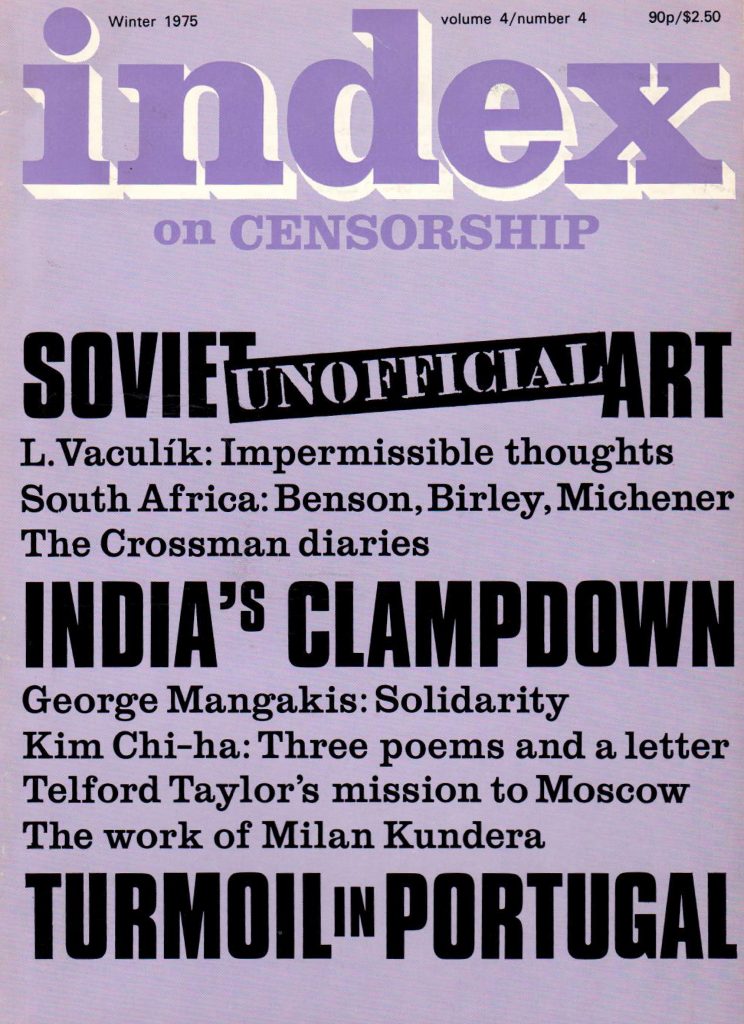
Soviet “unofficial” art
December 1975, vol. 4 issue: 4
Alexander Glezer writes about his participation in organising the unofficial art exhibit in Moscow. When the first exhibition opened, it was bulldozed by undercover police officers and agents from the KGB (Committee for State Security). In the second exhibition, the authorities were forced by the public to grant permission and ten to fifteen thousand people came to see the paintings and sculptures of 50 nonconformist artists’. Glezer, 41-years-old, was questioned by the KGB, arrested and sentenced 10 days for “hooliganism”. He was allowed to leave the Soviet Union in 1975 February.
Read the full article

Portugal: Art triumphant
December 1974, vol. 3 issue: 4
The Sao Mamed Gallery opened with 186 artworks by 87 artists who had never shown their work in public before due to the regime’s dictating of Portuguese life. The gallery was built to celebrate the result of the military coup abolishing censorship of expression.
Published in the New York Times.
Read the full article

Art of Resistance
September 2012, vol. 41 issue: 3
Malu Halasa, co-curator of the exhibition Culture in Defiance: Continuing Traditions of Satire, Art and the Struggle for Freedom in Syria, writes about how the violence in Syria affected country’s art of resistance production and then created ideas of spreading this work further West which was the reason for the exhibition’s creation.
Read the full article

Dark Arts: Three Uzbek artists speak out on state constraints
December 2014, vol. 43 issue: 4
Author Nargis Tashpulatova interviews writer three Uzbek artists – Sid Yanishev, photographer Umida Akhmedova and conceptual artist Vyacheslav Akhunov who continue to create artwork throughout governmental threats and censorship and the regression of art in Uzbek society.
Read the full article
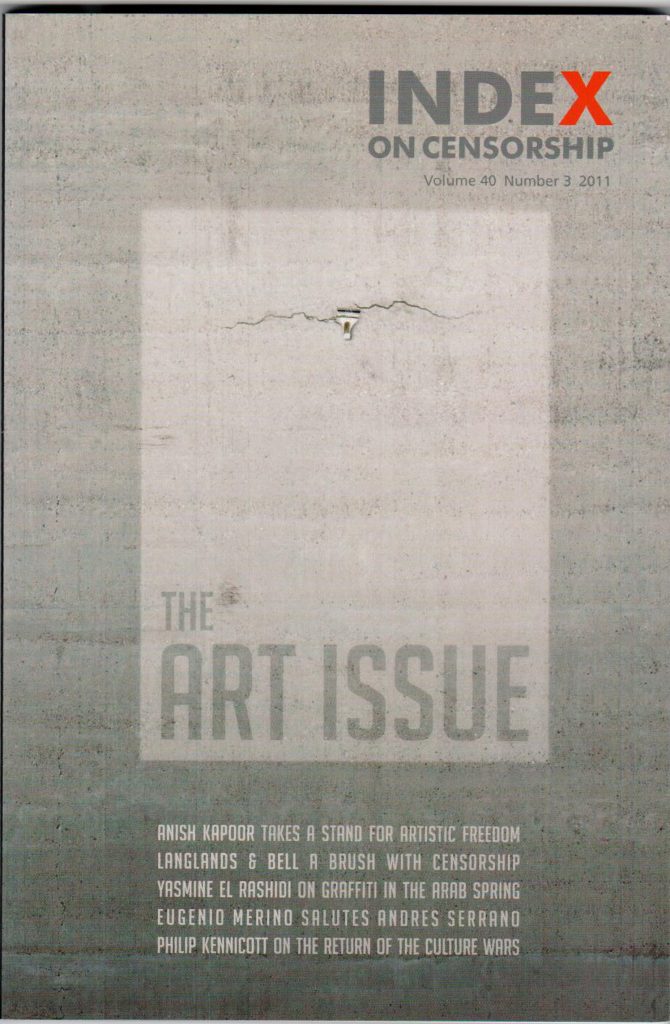
Art or Vandalism
October 2011, vol. 40 issue: 3
Yasmine El Rashidi writes on the outbreak of graffiti in the streets in Cairo during the 18 days of the Egyptian revolution.
Read the full article
[/vc_column_text][/vc_column][/vc_row][vc_row][vc_column][vc_basic_grid post_type=”post” max_items=”4″ element_width=”6″ grid_id=”vc_gid:1546513460633-7f241be5-ccf1-1″ taxonomies=”8890″][/vc_column][/vc_row]














